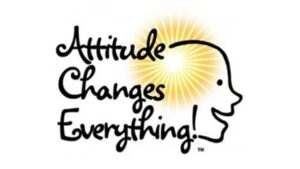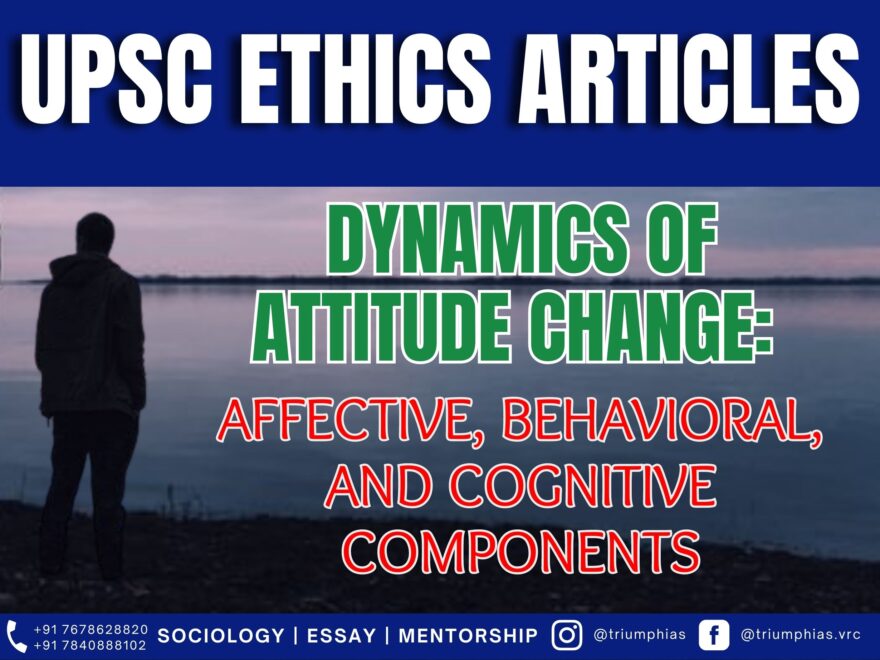Attitude Change
(Relevant for Ethics, Integrity and Aptitude)

Attitude Change
“Attitude is the State of mind or a set of views or settled way of thinking or feeling about something in a particular way which has an evaluative feature (Positive, Negative or Neutral)” Attitude is part of social Psychology.
Attitudes are abstract constructs, not something we can directly observe. We can observe them only with behaviour. To elaborate, whenever a person sees or think about targeted object, the sum of thoughts and emotions that created in a person constitute attitude.
In our day to day life, our attitude determines our behaviour towards people, situations, events etc. which in turn shapes the larger social interaction in societies.
Attitudes are not fixed and can be voluntarily or involuntarily changed.
- Explicit Attitude (Conscious)– If a person is aware of his attitudes and how they influence his behaviour, then those attitudes are explicit. Explicit attitudes are formed consciously.
- Implicit Attitude (Sub-Conscious) – If a person is unaware of his attitudes (beliefs) and how they influence his behaviour, then those attitudes are implicit. Implicit attitudes are formed subconsciously.
Attitude has three components ABC Model: Affective, Behavioral and Cognitive
Affective component
- Feelings or emotions linked to an attitude object
- Usually come from a person’s moral belief or value systems
Behavioral component
- The way one tends to act or behave when exposed to an attitude object
- Past behaviors or experiences regarding an attitude object
Cognitive component
- Beliefs, thoughts, and attributes that would associate with an object
- Cognitive – Our thoughts, beliefs, and ideas about something. ex-what u think about snake
- Affective – Feelings or emotions that something evokes. e.g. fear, sympathy, hate. ex-what u fell when u see snake
- Behavioral– Tendency to act, not the actual acting; what we intend and what we do may be quite different, ex- last time our reaction when we saw snake.
Attitudes are not fixed and can be voluntarily or involuntarily changed.
Several ways or factors contribute to attitude change:
- Persuasion: Attitudes can be influenced through persuasion. Anderson proposes that altering the inter-structural composition of an associative network can be achieved by activating a single node. By activating an affective or emotional node, it becomes possible to induce attitude change.
- Response to Communication: Hovland and his colleagues conducted experimental research to understand attitude change as a response to communication. They explored various factors that can impact the persuasiveness of a message.
- Emotions play a significant role in persuasion, social influence, and attitude change.
- Emotion collaborates with cognitive processes, influencing the way we think.
- Emotional appeals are frequently employed in advertising, health campaigns, and political messages. For instance, recent examples include health campaigns discouraging drinking and political advertisements emphasizing the fear of terrorism.
- Affective forecasting, often referred to as intuition or the anticipation of emotions, also plays a role in attitude change. Studies indicate that predicting emotions is a crucial aspect of decision-making.
To master these intricacies and fare well in the Sociology Optional Syllabus, aspiring sociologists might benefit from guidance by the Best Sociology Optional Teacher and participation in the Best Sociology Optional Coaching. These avenues provide comprehensive assistance, ensuring a solid understanding of sociology’s diverse methodologies and techniques.
Best Sociology Optional Teacher, Best Sociology Optional Coaching, Sociology Optional Syllabus, attitude change, social psychology, explicit attitude, implicit attitude, ABC model, affective component, behavioral component, cognitive component, persuasion, emotion, communication, decision-making, health campaigns, political influence, Hovland.

Choose The Best Sociology Optional Teacher for IAS Preparation?
At the beginning of the journey for Civil Services Examination preparation, many students face a pivotal decision – selecting their optional subject. Questions such as “which optional subject is the best?” and “which optional subject is the most scoring?” frequently come to mind. Choosing the right optional subject, like choosing the best sociology optional teacher, is a subjective yet vital step that requires a thoughtful decision based on facts. A misstep in this crucial decision can indeed prove disastrous.
Ever since the exam pattern was revamped in 2013, the UPSC has eliminated the need for a second optional subject. Now, candidates have to choose only one optional subject for the UPSC Mains, which has two papers of 250 marks each. One of the compelling choices for many has been the sociology optional. However, it’s strongly advised to decide on your optional subject for mains well ahead of time to get sufficient time to complete the syllabus. After all, most students score similarly in General Studies Papers; it’s the score in the optional subject & essay that contributes significantly to the final selection.
“A sound strategy does not rely solely on the popular
Opinion of toppers or famous YouTubers cum teachers.”
It requires understanding one’s ability, interest, and the relevance of the subject, not just for the exam but also for life in general. Hence, when selecting the best sociology teacher, one must consider the usefulness of sociology optional coaching in General Studies, Essay, and Personality Test.
The choice of the optional subject should be based on objective criteria, such as the nature, scope, and size of the syllabus, uniformity and stability in the question pattern, relevance of the syllabic content in daily life in society, and the availability of study material and guidance. For example, choosing the best sociology optional coaching can ensure access to top-quality study materials and experienced teachers. Always remember, the approach of the UPSC optional subject differs from your academic studies of subjects. Therefore, before settling for sociology optional, you need to analyze the syllabus, previous years’ pattern, subject requirements (be it ideal, visionary, numerical, conceptual theoretical), and your comfort level with the subject.
This decision marks a critical point in your UPSC – CSE journey, potentially determining your success in a career in IAS/Civil Services. Therefore, it’s crucial to choose wisely, whether it’s the optional subject or the best sociology optional teacher. Always base your decision on accurate facts, and never let your emotional biases guide your choices. After all, the search for the best sociology optional coaching is about finding the perfect fit for your unique academic needs and aspirations.
To master these intricacies and fare well in the Sociology Optional Syllabus, aspiring sociologists might benefit from guidance by the Best Sociology Optional Teacher and participation in the Best Sociology Optional Coaching. These avenues provide comprehensive assistance, ensuring a solid understanding of sociology’s diverse methodologies and techniques. Sociology, Social theory, Best Sociology Optional Teacher, Best Sociology Optional Coaching, Sociology Optional Syllabus.
Best Sociology Optional Teacher, Sociology Syllabus, Sociology Optional, Sociology Optional Coaching, Best Sociology Optional Coaching, Best Sociology Teacher, Sociology Course, Sociology Teacher, Sociology Foundation, Sociology Foundation Course, Sociology Optional UPSC, Sociology for IAS,
Follow us :
🔎 https://www.instagram.com/triumphias
🔎https://www.youtube.com/c/TriumphIAS
https://t.me/VikashRanjanSociology
Find More Blogs
|
Scope of the subject and comparison with other social sciences |
|||
|
|
|
|
Modernity and social changes in Europe |

